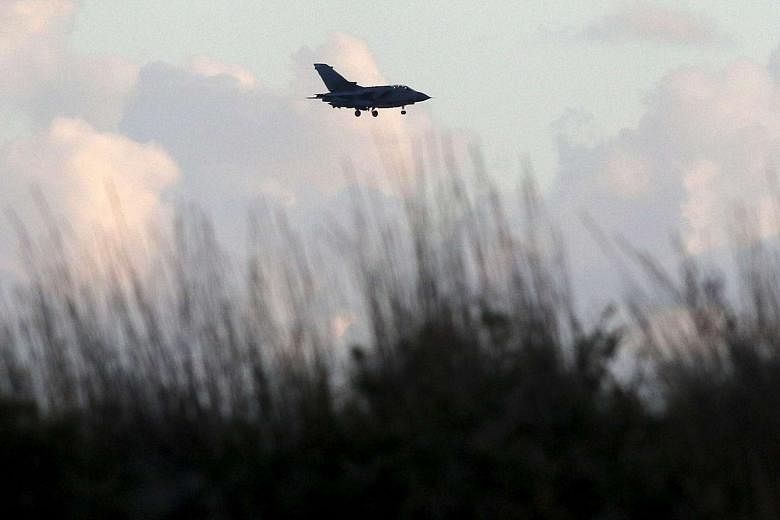LONDON/MOSCOW (REUTERS) - Britain joined air strikes on Syria on Thursday (Dec 3) in a show of European solidarity against the Islamic State in Iraq and Syria (ISIS) militant group, but Vladimir Putin issued bitter new denunciations of Turkey for shooting down a Russian plane, demonstrating the world's lack of unity.
British Tornado jets took off from the Royal Air Force base at Akrotiri in Cyprus before dawn on Thursday (Dec 3), hours after the British parliament voted 397-223 to support Prime Minister David Cameron's plan to extend air strikes from Iraq to Syria. Britain said they struck oil fields used to fund ISIS.
"There are plenty more of these targets throughout eastern, northern Syria which we hope to be striking in the next few days and weeks," Defence Secretary Michael Fallon said. Britain would send eight more warplanes to Cyprus to join the missions.
The British contribution forms only a tiny part of US-led"Operation Inherent Resolve", which has been bombing ISIS targets in both Iraq and Syria for more than a year with hundreds of aircraft. Previously, the small British contingent participated in strikes on Iraq but not Syria.
The strikes have so far failed to dislodge the militants from a swathe of territory where they have proclaimed a Caliphate to rule over all Muslims, although Washington and its allies say they have helped halt the fighters' advance.
Although the British vote adds negligible new military capability to the coalition, it has taken on outsized political and diplomatic significance since gunmen and bombers killed 130 people last month in Paris. France had called for solidarity from Europe's other main military power in expanding military action.
Most of the world's powers are now flying combat missions over Iraq and Syria against ISIS. But any consensus on how to proceed has been thwarted by opposing policies towards the 4-year-old civil war in Syria, which has killed 250,000 people, driven 11 million from their homes, left swathes of territory in the hands of jihadist fighters and defied all diplomatic efforts at a solution.
Russia is bombing Syria outside the US-led coalition. Moscow and Teheran support Syrian President Bashar al-Assad, while the United States and its European, Arab and Turkish allies want him gone.
"ALLAH DEPRIVES TURKS OF WISDOM"
After ISIS claimed responsibility for both the attacks on Paris and the bombing of a Russian airliner last month, world leaders have strived to bury differences and unite the separate campaigns against the militants.
But those initiatives were dealt a sharp blow last week when Turkey, a member of the Nato alliance that is housing 2 million refugees from Syria and supporting opponents of Assad, shot down a Russian jet.
The pilot was killed and another Russian service member died rescuing the plane's navigator. "It appears that Allah decided to punish the ruling clique of Turkey by depriving them of wisdom and judgment," Russian President Putin said on Thursday (Dec 3) during his annual state of the nation speech.
Moscow has already responded with measures including bans on some Turkish fruit and vegetables, and in his icy remarks Putin made clear that would not be the end of it.
"If anyone thinks that having committed this awful war crime, the murder of our people, that they are going to get away with some measures concerning their tomatoes or some limits on construction and other sectors, they are sorely mistaken." Turkey would have cause to regret its actions "more than once," he said.
Minutes after the speech, his energy minister announced the suspension of a gas pipeline project.
Moscow says its main target is ISIS, but most of its air strikes have hit other groups opposed to Assad, many of which are supported by US allies, including Turkey.
Turkey has strongly rejected Russian allegations it has any links with ISIS militants. On Wednesday (Dec 2) Russia made it personal, saying Turkish President Tayyip Erdogan's family was directly profiting from ISIS oil smuggling.
Erdogan has refused to apologise for shooting down the Russian plane, which Turkey says had strayed into its air space and ignored repeated warnings. Moscow says it was shot down over Syria unprovoked.
Turkey has been furious that Russia targeted opponents of Assad unrelated to ISIS, especially ethnic Turkmen in villages near the frontier that are close kin of Turks.
Erdogan sought a meeting with Putin on the sidelines of a climate conference in Paris last week, but was snubbed. Nor has the Russian leader taken his phone calls.
DEBATE
The divisive debate in Britain over whether to extend air strikes to Syria showed how fraught the subject has become for politicians in Western countries, with no easy answers for a civil war that has produced the biggest refugee crisis since World War Two and drawn in thousands of disaffected youths from Western countries to the jihadi cause.
After 15 years in which hundreds of British troops died serving as the main battlefield ally of the United States in Iraq and Afghanistan, many in Britain are wary of more war in the Middle East.
The vote split Britain's opposition Labour Party: leader Jeremy Corbyn opposed it but foreign affairs spokesman Hilary Benn supported it in a passionate speech in parliament. Around a third of Labour lawmakers defied Corbyn to vote in favour. "We must now confront this evil. It is now time for us to do our bit in Syria," Benn said in his speech, which drew applause from lawmakers across the House of Commons.

